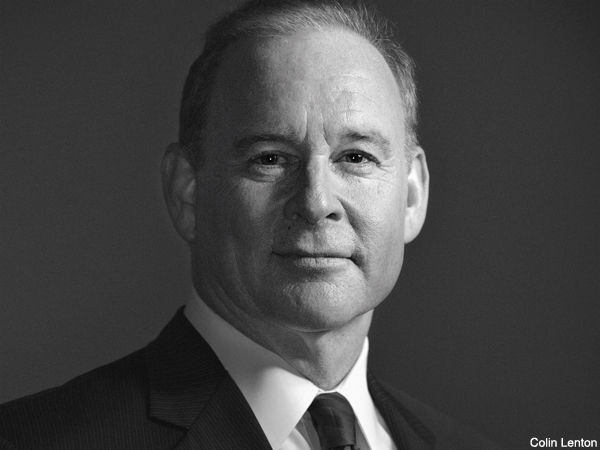Is Rob McCord the Tom Corbett Slayer?
Four hours into my morning with Pennsylvania Treasurer Rob McCord—after he’s analyzed the state of race relations in Boston, filled me in on his fitness regimen and his love of squash, demonstrated how best to ask rich people for money, outlined the strengths and weaknesses of Philadelphia’s nascent tech sector, and name-dropped the likes of George Stephanopoulos and Newt Gingrich—he stops talking, for just a moment, to quickly down a protein bar and a zero-calorie Powerade.
“I’m an aging jock,” the 53-year-old McCord says (for the third time that morning). “Got to stay lean.” And then he’s off again, this time on a five-minute soliloquy on the great buying opportunities presented by sub-investment-grade debt in Europe.
Brilliant babbling—if there is such a thing—is a McCord hallmark. The words tumble out of his mouth so relentlessly that talking to him feels less like a conversation than an unedited simulcast of his inner monologue. “So I fell in love with my wife, and also with microeconomics,” he says at one point, as segue to a riff on the wrongheadedness of GOP opposition to tax incentives.
At times you want to roll your eyes. And yet the overall effect is undeniably impressive. Ebullient, inquisitive and, yes, a bit undisciplined, McCord is unlike any prominent politician to cross the Pennsylvania stage in years. And he’s obviously having an awfully good time.
As well he should. Life has been very good to McCord, an ambitious Main Liner and venture capitalist turned political aspirant. He is a rich man gifted both with the right connections and the talent to maximize those advantages. Born into an academic family, he was schooled at Harvard and Wharton. He was mentored in politics by two-time U.S. Cabinet Secretary Norman Mineta, and in business by legendary former Safeguard Scientifics CEO Pete Musser. He made millions investing in tech start-ups, then waltzed into statewide elected office four years ago as a first-time candidate. And in early November, he was easily reelected to a second term as state treasurer.
And so, in a state Democratic Party short on high-profile talent, McCord’s profile is surging, and the calls for him to challenge Governor Corbett in 2014 are growing louder. State Democratic chairman Jim Burn says McCord is a “top-tier” name “held in the highest esteem” by party bosses. Congressman Chaka Fattah pronounces himself a “big fan.” Philadelphia Democratic Party boss Bob Brady considers him “formidable” and “probably our strongest candidate.”
What makes this establishment enthusiasm for McCord so interesting is the fact that he in no way resembles gubernatorial candidates of the past. Pennsylvanians tend to be traditionalists when it comes to their elected leaders. Governors Corbett and Rendell are both redolent of the 20th century, with old-fashioned political résumés and brands (Rendell the charismatic operator, Corbett the sober uncle). So were Dan Onorato (a longtime lawyer and pol) and Lynn Swann (the ex-athlete trope).
McCord, though, is a thoroughly modern politician. He’s run a think tank and a series of investment funds. He’s considered a critical early leader in the development of the region’s tech industry. He has an African-American wife. And he entered politics late in life, meaning he has ascended without the benefit—or baggage—of a machine to call his own.
All of which makes him one of the most intriguing figures to appear on Pennsylvania’s political stage in some time. Can a candidate as novel and contemporary as McCord win in a state this conventional? He seems sure to test that question. But when?



